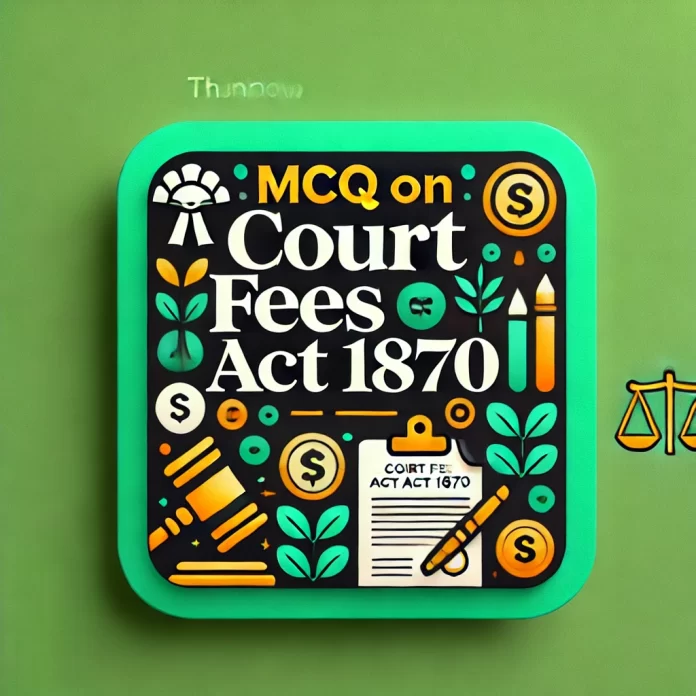Court Fees Act, 1870 – MCQ (Set 1)
- What is the main purpose of the Court Fees Act, 1870?
a) To regulate the functioning of courts
b) To impose a fee on litigants for using court services
c) To specify the jurisdiction of courts
d) To establish rules for evidence
- Which section of the Court Fees Act provides for exemptions from payment of court fees?
a) Section 19
b) Section 20
c) Section 21
d) Section 22
- Under which section does the Act provide for refund of court fees?
a) Section 14
b) Section 16
c) Section 18
d) Section 20
- What does “ad valorem fee” mean under the Court Fees Act?
a) Fixed fee irrespective of the claim amount
b) Fee calculated based on the claim amount
c) Fee charged for appeals only
d) None of the above
- What is the significance of Section 7 of the Court Fees Act, 1870?
a) Provides rules for stamp duty
b) Specifies fees for specific suits
c) Grants exemptions
d) Deals with refunds of fees
- In which case did the Supreme Court hold that court fees cannot be waived arbitrarily?
a) State of Punjab v. Ajaib Singh
b) Central Coalfields Ltd. v. Jaiswal Coal Co.
c) State of Maharashtra v. Marwanjee Pitalwala
d) Subramanian Swamy v. Union of India
- What is the maximum penalty for fraudulently undervaluing a suit under the Act?
a) Fine equal to court fees
b) Double the court fees
c) Imprisonment up to one year
d) Fine and imprisonment
- Under which provision can the government remit court fees?
a) Section 35
b) Section 30
c) Section 31
d) Section 32
- Which Schedule of the Act provides a table of court fees?
a) Schedule I
b) Schedule II
c) Schedule III
d) Schedule IV
- Which case discussed the constitutional validity of the Court Fees Act, 1870?
a) Union of India v. J.K. Industries
b) In Re: Special Courts Bill, 1978
c) Secretary, Government of Madras v. Zenith Lamp
d) Prag Ice & Oil Mills v. Union of India
- Can an indigent person file a suit without paying court fees?
a) Yes, under Order XXXIII CPC
b) No, everyone must pay fees
c) Yes, if approved by the President
d) No, unless a special exemption is granted
- What is the role of Section 20 in the Court Fees Act?
a) Refund of fees in certain cases
b) Transfer of cases
c) Determination of jurisdictional value
d) Exemptions from fees
- Which High Court judgment clarified computation of ad valorem fees?
a) Delhi High Court in Vishnu Prasad v. State
b) Bombay High Court in Anand Rao v. Balaji Rao
c) Calcutta High Court in Basanti Devi v. Biswanath Ghosh
d) Allahabad High Court in Nand Kumar v. State
- Under which provision is the undervaluation of a suit addressed?
a) Section 6
b) Section 10
c) Section 8
d) Section 12
- Can the court reject a plaint for insufficient court fees?
a) No, courts cannot reject plaints
b) Yes, under Order VII Rule 11 CPC
c) No, but it can demand more fees
d) Yes, under Order VI Rule 10 CPC
- What does Section 13 of the Act deal with?
a) Exemption from court fees
b) Penalty for undervaluation
c) Refund of court fees on appeals
d) Valuation in the High Court
- In which Supreme Court case was it held that “court fees are a source of revenue for the state”?
a) State of Karnataka v. Rameshwara Rice Mills
b) Bengal Immunity Co. v. State of Bihar
c) Salig Ram v. Union of India
d) State of Punjab v. Gurdev Singh
- Who decides disputes related to the adequacy of court fees paid?
a) Registrar of the Court
b) Civil Judge
c) Court where the suit is filed
d) High Court
- Which section relates to the valuation of fees in suits concerning agricultural land?
a) Section 6
b) Section 7(3)
c) Section 8
d) Section 9
- What is the scope of Section 11 in the Court Fees Act?
a) Fee calculation for service suits
b) Stamp duty on affidavits
c) Fee exemption for paupers
d) Valuation disputes
ClickShow Answer
